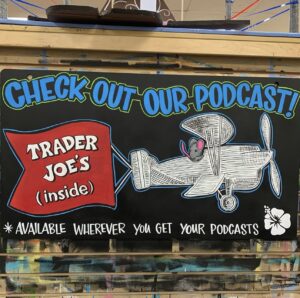Your Mic Is Hot, But Is Your Content?
Published on Feb. 11, 2025, at 2:43 p.m.
by Ella Kate Baker.
“We should start a podcast!” says anyone who has shared a common human experience. Podcasts are all the rage these days, and there’s an undeniable appeal to sharing random opinions on the internet for an hour.
But here’s the thing: Not everyone needs one.

Don’t get me wrong; I’m a strong believer that podcasts can be beneficial, but only for certain reasons. For brands, they’re a powerful tool to express personality in ways other forms of public relations simply can’t, thanks to the conversational delivery and authentic tone.
Unlike social media posts, podcasts allow brands and creators to engage in long-form storytelling and ultimately share a deep connection with their listeners. But there’s a thin line between what’s a worthy listen and what’s not.
A well-executed podcast can build trust and loyalty, giving audiences a reason to come back. However, long-form content demands sustained engagement, and that’s where many creators struggle. Without compelling stories and intellectual insight, even the best intentions fall flat.
Before jumping on the podcast bandwagon, it’s essential to know if it’s beneficial for your brand. We’ve all encountered a number of creators who assume they can maintain an engaging conversation — until they can’t.
In 2022, MAC Cosmetics released “The T-Zone,” a podcast discussing culture, fashion and beauty. Three episodes and two positive reviews later, the podcast ended without warning.

In contrast, Trader Joe’s “Inside Trader Joe’s,” a podcast diving into the inside scoops of the company’s story and culture, has been thriving since 2018.
With over six million podcasts on Spotify, the industry is constantly being oversaturated with the same content. Finding a unique angle for you or your brand is crucial. What do you bring to the table that hasn’t already been said? And please, no more 30-episode sagas about toxic exes.
The industry has largely shifted into influencers with a mass following, promoting products and bringing in high-profile guests. Unlike formal interviews, podcasts can invite guests from completely different backgrounds, merging audiences as listeners inherently trust guests introduced by a host they already trust. A prime example was former U.S. Vice President Kamala Harris appearing on Alex Cooper’s “Call Her Daddy,” a podcast known for its candid discussions around sex and relationships — definitely not on anyone’s 2024 bingo card.
With a podcast industry this big, success requires more than just big names and brand promotion — it demands thoughtful structure and originality. Anyone can start a podcast, but sustaining an audience in such a competitive space is the real challenge.
So the next time you’re thinking about picking up the mic, think to yourself: How long can I stay relevant?



